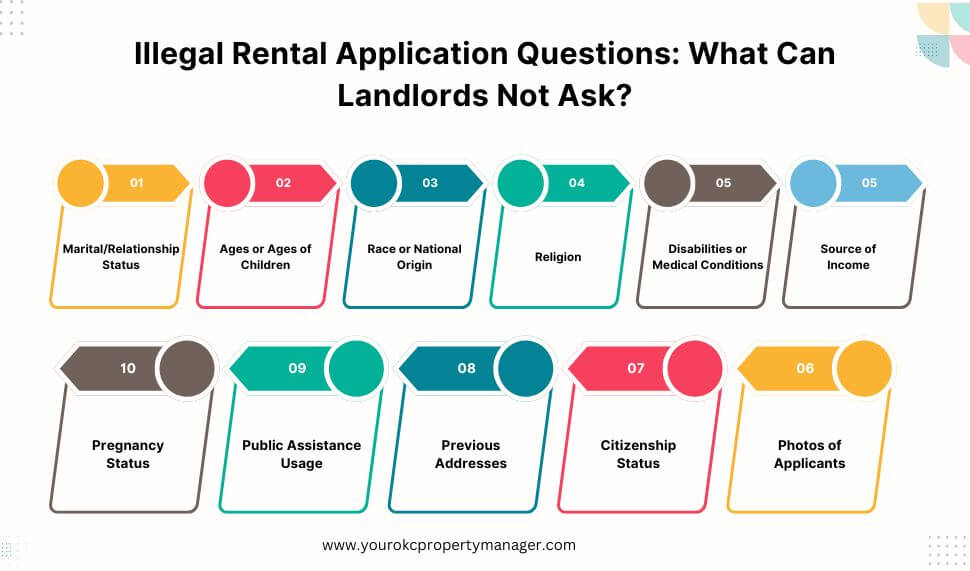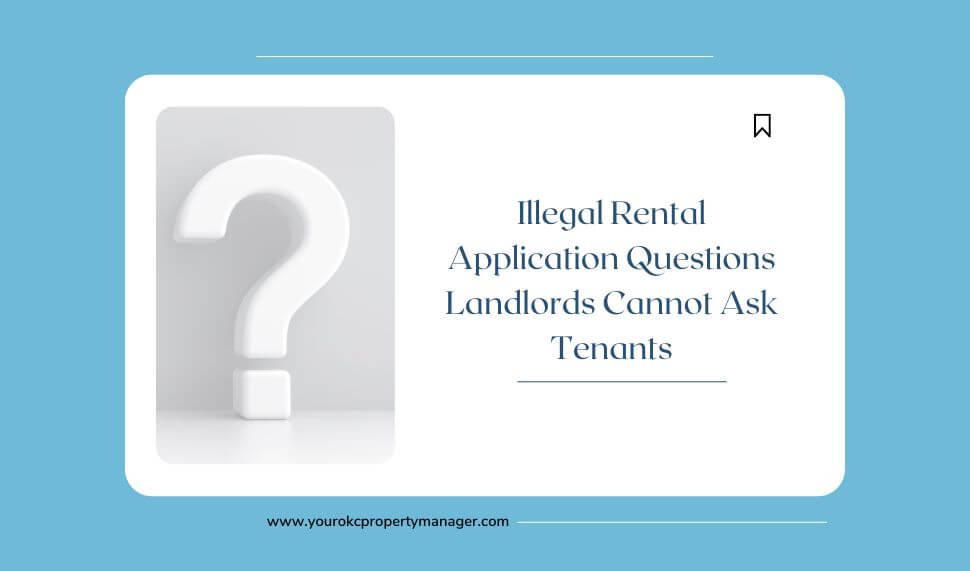Tenants screening and reviewing rental applications is an important part of ensuring you find responsible renters who will take good care of your property. However, there are certain questions you cannot legally ask on a rental application due to fair housing laws. Asking protected questions can open you up to discrimination claims.
In this article, we’ll cover 11 common but illegal questions to avoid on your rental application and explain why each question violates fair housing regulations.
Illegal Rental Application Questions: What Can Landlords Not Ask?

- Marital/Relationship Status
- Ages or Ages of Children
- Race or National Origin
- Religion
- Disabilities or Medical Conditions
- Source of Income
- Photos of Applicants
- Citizenship Status
- Previous Addresses
- Public Assistance Usage
- Pregnancy Status
1. Marital/Relationship Status
Questions about an applicant’s marital status, family status, spousal details, or sexuality are off-limits. This is considered a privacy issue under the Fair Housing Act (FHA). Marital/relationship status is a protected class, and questions relating to it could indicate potential housing discrimination.
Instead of asking, “What is your marital status?” you can ask, “How many people will be occupying the property?” to understand the potential number of occupants without requesting details about relationships or partnerships.
2. Ages or Ages of Children
Asking for ages or specifics about children’s ages is illegal. This violates prohibitions against familial status discrimination. However, you are allowed to know if the property is suitable for the household size and make occupancy limits.
A better question is, “Will anyone under 18 be residing at the property? If yes, how many?” This confirms family size without asking for protected age details. It is crucial to adhere to these guidelines to ensure that you are not discriminating against a prospective tenant during the screening process.
3. Race or National Origin
Requesting an applicant’s race, skin color, nationality, place of birth, or ethnic background is unlawful housing discrimination. Property owners must adhere to fair housing laws, ensuring that people of all backgrounds should be treated equally in the rental process. There are also laws prohibiting discrimination based on race or national origin.
Rather than filling these protected categories on an application, focus on standard identifying information like name and contact details to properly ID each applicant.
4. Religion
Questions about an individual’s religious affiliation, activities, or beliefs are inappropriate. Housing decisions must be made irrespective of faith, creed, or religious observances.
There is no lawful substitute needed here – avoid soliciting any information regarding religion on applications. For screening purposes, stick to factual details such as rental history and income while ensuring compliance with regulations that protect individuals from discrimination based on protected characteristics, including religion.
5. Disabilities or Medical Conditions
Inquiring into an applicant’s physical or mental health history crosses the line. However, you are permitted to ask if applicants will need any reasonable accommodation for a disability. Questions landlords cannot ask include inquiries about specific disabilities or medical conditions, as these are protected under fair housing laws.
An acceptable question is: “Do you or anyone in your household require any accommodations to utilize the property due to a disability? If yes, please describe the accommodation required so we can evaluate if it is reasonable.”
6. Source of Income
Questions probing lawful sources of income like alimony, child support, or public assistance can indicate discrimination. Income requirements must be applied universally to all rental applicants.
Instead of asking, “How do you earn income?” simply ask, “What is your total verifiable monthly household income?” and accept a variety of supporting proof, such as pay stubs, tax returns, or bank statements. Thus, you must treat all sources of income equally to comply with fair housing laws and avoid potential legal troubles.
Also Read: How to Verify a Prospective Tenant’s Income?
7. Photos of Applicants
Requesting photos serves no valid screening purpose and increases the potential for bias, whether conscious or unconscious. Photos should not factor into housing decisions.
Ensure your application does not prompt or offer an area to attach/upload photos. Rely on legal identification verification methods only, such as driver’s licenses or passports. When dealing with potential tenants, it is important to avoid requesting photos to prevent discrimination and ensure compliance with fair housing laws.
8. Citizenship Status
Citizenship, immigration status, and national origin are protected classes. While you can verify that applicants can legally rent the property, inquire only about their ability to enter a legal rental agreement—do not probe personal background details.
Ask instead, “Will you be able to provide proof of legal status allowing you to rent a property in this area?” while accepting standard government IDs for screening. Understanding what can a landlord ask for on a rental application is essential to ensure compliance with fair housing regulations and avoid potential legal issues.
9. Previous Addresses
Requesting an extended residential history is unnecessary for most rentals and could discriminate against applicants who have experienced housing instability outside their control, like due to poverty, disabilities or homelessness.
Reasonably obtain the two most recent verifiable addresses to conduct reference checks without overly screening applicants or judging those with previously non-traditional housing situations.
10. Public Assistance Usage
The use of public benefits like Section 8 vouchers, welfare programs, or other subsidies should not affect an application. Lawful sources of income must be viewed impartially. Landlords cannot ask about public assistance usage.
Remove “Have you ever received public assistance?” from applications entirely, then accept a wide range of qualifying income proof, including assistance verification documents.
11. Pregnancy Status
Questions regarding pregnancy, plans for future pregnancy, or number/ages of children are prohibited forms of familial discrimination. Pregnancy is considered a temporary disability under the law. Thus, sexual orientation is another protected characteristic, and questions related to this cannot be asked.
Again, avoid soliciting personal medical details. Ask only suitability questions regarding occupancy limits, needed property configurations, or potential reasonable accommodations for a condition limiting housing access.
Note: You can also read to understand what a landlord cannot do.
So What Can I Ask About on a Rental Application?
While it’s important to gather relevant information for informed decisions during the tenant screening process, those discussed above are specific questions to avoid due to legal implications or discriminatory nature.
However, there are some essential rental reference questions you can ask for tenants to screen prospective tenants adhering to legal compliance or fair housing regulations to avoid potential issues. Here some of them are listed below:
- Verifiable income sources and amounts
- Current and past rental references
- Employment history
- Landlord references
- Occupancy details
- Credit/payment history
- Criminal history (with limitations)
Focus on questions directly related to screening for qualifications like the ability to pay rent, compliance with lease terms, care of the property, and respect for neighbors and community rules. Avoid unnecessary personal questions. Know rental verification questions that can be asked.
Conclusion on Questions Landlords Cannot Ask
Being a landlord, you need to be aware of fair housing regulations and avoid any questions or practices that could be perceived as discriminatory. By focusing on the essential information needed for responsible tenant screening, landlords can ensure a fair and compliant rental application process.
If you have any doubts and want to learn more about illegal rental application questions and property management, contact OKC Home Realty Services.
Frequently Asked Questions
Can I ask for criminal background checks?
Yes, criminal background checks used responsibly do not violate fair housing laws. However, you must apply screening criteria universally without consideration to protected classes. Look out only for criminal records directly related to potential lease violations like property damage or disturbances to other residents.
Can a landlord deny a rental application without any evictions or red flags on the applicant's record?
In short, yes, a landlord can deny a rental application without any evictions or red flags, as long as their set certain criteria and standards for selecting tenants do not violate any fair housing laws or discriminate against protected classes.

Author
Scott Nachatilo is an investor, property manager and owner of OKC Home Realty Services – one of the best property management companies in Oklahoma City. His mission is to help landlords and real estate investors to manage their property in Oklahoma.
 (
(









